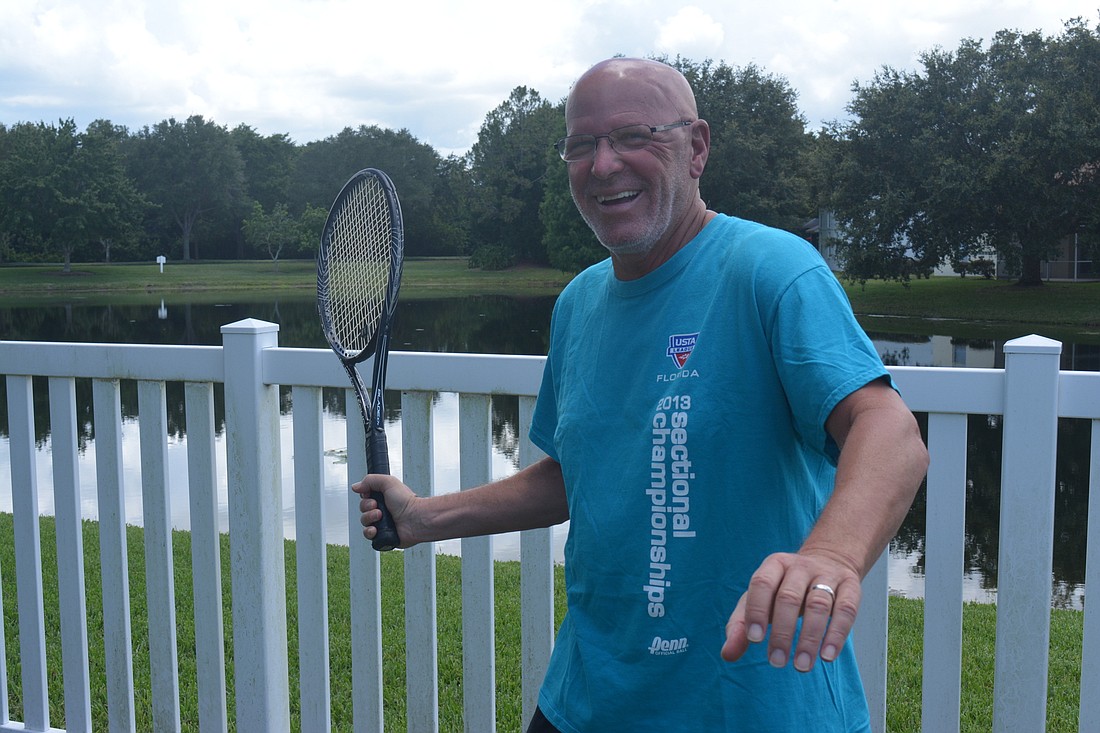- November 24, 2024
-
-
Loading

Loading

The first place Barry Caplan wanted to go after checking out of the hospital was the Lakewood Ranch Golf and Country Club’s Tennis Center.
He still had 25 staples in his head from brain surgery three days prior, on April 18, but the 68-year-old Caplan didn’t care. He needed to see his people. So he told his wife, Marci Caplan, and off he went.
He was first diagnosed with a glioblastoma tumor April 11. He and Marci were at Publix when he started experiencing aphasia, the inability to express or understand speech.
The effects lasted for two to three minutes, and the couple thought it might have been a stroke. Marci Caplan persuaded her husband to go to the hospital.
The doctors knew it was not a stroke when they received the MRI results. Barry Caplan knew, too. He used to read MRIs when he worked at Einstein Medical Center Philadelphia, with the Trauma and Critical Care team. He saw the gray mass lodged in his brain. It was big, he remembers, and malignant.
“I thought, ‘OK, this is something that happened to us, let’s get on with it,’” he said. “‘Let’s do whatever we have to do.’”
About two-thirds of the tumor was removed in the April 18 surgery. Six weeks after the surgery, Caplan started having radiation therapy treatments. He also underwent chemotherapy.
The tumor was in the speech and language center of his brain. Now, translating thoughts to speech sometimes gives him trouble, but it’s getting better. He gets tired more frequently, but that’s been the only real side effect of the medication thus far.
To keep his brain sharp, Barry and Marci Caplan go to trivia every Thursday night at Ed’s Tavern. Barry Caplan also fills out crossword puzzles.
His doctors told him to do whatever he was capable of doing physically during the treatments. They didn’t expect him to be playing tennis so quickly, but it was the one thing he was determined not to lose during his fight.
Barry and Marci Caplan met 23 years ago in Philadelphia. Their second date was a tennis match. Barry Caplan had played some on playgrounds in his youth, but never in a serious fashion. Marci Caplan had always enjoyed the game, and he soon fell in love with it, and her. The couple married in 2008, and moved to Lakewood Ranch in 2010. Soon after, they joined Lakewood Ranch’s United States Tennis Association 40 and up mixed team.
“It has made our lives wonderful,” he said. “It’s full of nice, kind people. The community really embraced us.”
The team played in the league’s sectional championships June 9-11 in Orlando. Three weeks after his surgery, he began some light volleying with his wife. A week later, he was practicing with the team. When the tournament rolled around, he was there, competing with partner Victoria Reid.
For that tournament, the team — typically nameless — went by Team Barry.
“Team Barry” didn’t make it past sectionals. No one cared. They all knew that weekend was bigger than tennis. The Caplans want to use his story to let others know a diagnosis doesn’t have to mean you stop living.
“We hope to be an inspiration,” Marci Caplan said.
July 7 was his last radiation treatment. Now, he waits for another MRI to see how effective they were.
“It’s just one day at a time,” Barry said, of his life after brain surgery. “And I appreciate them all.”